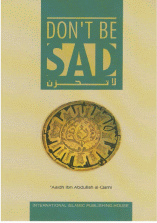Don't be Sad

To Him do the good words ascend
The Messenger of Allah (Blessings and Peace be upon him) taught his Companions a number of beautiful invocations, invocations that were brief in length but far-reaching in their implications.
Abu Bakr (may Allah be pleased with him) asked the Prophet (bpuh) to teach him a supplication and he answered:
"Say: 'O' my Lord, verily, I have greatly wronged myself and no one forgives sins except you. So forgive me with your forgiveness and have Mercy on me, since verily, you are the Oft-Forgiving, the Most Merciful."'
The Prophet (bpuh) said to 'Abbaas (may Allah be pleased with him):
"Ask Allah for pardon and good health." .
And he said to 'Ali (may Allah be pleased with him):
"Say: 'O' Allah, guide me and direct me (to the right path)."
He (bpuh) said to 'Ubayd ibn Husayn (may Allah be pleased with him):
"Say: 'O' Allah, Inspire me to the right guidance and protect me from the evil of my own self"
He (bpuh) taught Shaddad ibn Aws (may Allah be pleased with him) to say:
"O' Allah, I ask you to make me steadfast in the matter (of Religion), resolute upon right guidance, thankful for Your blessing, and diligent in Your worship. And I ask you, O' Allah, to make my heart sound, my tongue truthful; and I ask You from the good that You know I seek refuge in You from the evil that You have full knowledge about and I ask Your forgiveness for that which You (completely) know of Truly You are the Knower of all things unseen."
And he taught Mu'aadh (may Allah be pleased with him) to say:
"O' Allah, help me to remember You, to thank You, and to worship You excellently?
That we should ask for Allah's Pleasure and for His Mercy in the Hereafter, that we invoke Allah to save us from His anger and punishment, and that we ask Him for help in worshipping Him and thanking Him W- these are some of the more salient themes that are stressed in the previous supplications.
Regarding these themes, there is one uniting or common factor: that we should seek what is with Allah and turn away from what is in this world, or in other words, that we must not be covetous of material things that are, by their very nature, evanescent.
